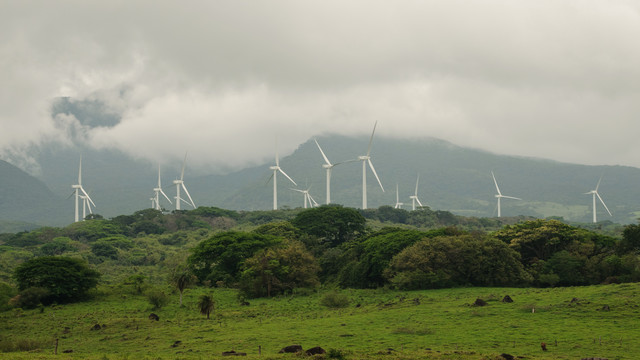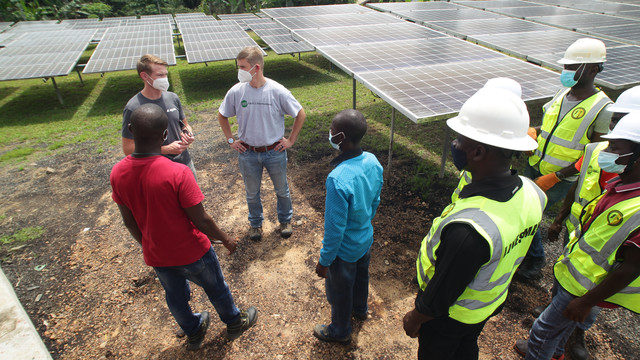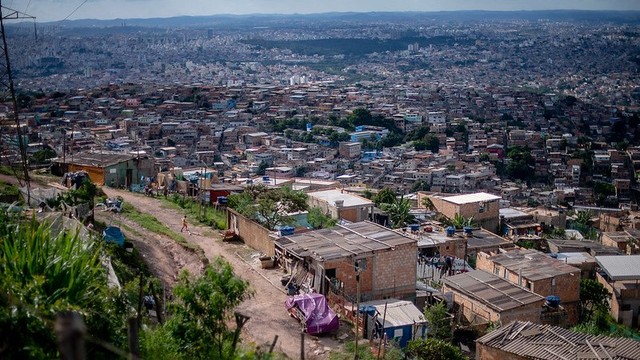The glass is half full: in 2015 we need to demand that our leaders deliver
As leaders from the worlds of politics, business and civil society gather in the Swiss ski resort of Davos for the World Economic Forum, IIED's chief economist argues that "hope" is the most scarce resource for building a better world.


More than 40 heads of state and 2,500 delegates representing business, government and NGOs are attending the World Economic Forum in Davos (Photo: swiss-image.ch/Michael Buholzer, Creative Commons via Flickr)
This year's Davos agenda is all about crisis, conflict and instability, but is this really what is going on? I think that the glass is half full and hope is one of our most important scarce resources.
We need that hope to spur us on. We need that hope to demand that our leaders deliver on reaching a climate agreement, agree and implement the Sustainable Development Goals (SDGs) to end poverty and find the money to make all this happen. This hope is based on the very real progress that I have seen on reducing poverty and tackling climate change.
The World Economic Forum (WEF) at Davos started as a meeting of economic decision-makers. While it remains by invitation only, it has now broadened out into a meeting of decision-makers from many diverse backgrounds – from government, business and civil society.
Make or break
If the WEF's founder Klaus Schwab's video address is anything to go by, this year is make or break: we are at a crossroads where we could face a world of disintegration, hate and fundamentalism. On the other hand, if we 'get things right' we have a world of solidarity and cooperation.
2015 is a crucial year when hope and confidence is especially needed in collective solutions to reach zero poverty and zero climate emissions. We need to guard against the pessimism and cynicism that will only disempower us.
We must not let our pessimism and concern create a context whereby it is OK to cut aid budgets because of fears over corruption, or to throw up our hands in defeat because we feel climate change is too big an issue to tackle.
While the voices of pessimism are many, seeing the glass as half empty, this seems too gloomy. Look beyond the headlines screaming about terrorism and a new cold war, and you can perhaps see that in some respects the glass is half full.
We already have made progress and we need to hope and strive for more.
In 2015, the Millennium Development Goals (MDGs) have been largely achieved – at least overall – with millions of poor women and men lifted out of poverty (although many pockets of terrible poverty endure).
As the UN Secretary-General wrote in the foreword for the 2014 MDGs report (PDF): "Global poverty has been halved five years ahead of the 2015 timeframe. Ninety per cent of children in developing regions now enjoy primary education, and disparities between boys and girls in enrolment have narrowed.
"Remarkable gains have also been made in the fight against malaria and tuberculosis, along with improvements in all health indicators. The likelihood of a child dying before age five has been nearly cut in half over the last two decades. We also met the target of halving the proportion of people who lack access to improved sources of water."
Find out more about IIED chief economist Paul Steele in the video interview below or watch it on IIED's YouTube channel.
Fantasy can become reality
As we move forward past the MDGs and towards the SDGs there is now serious commitment from the World Bank and others to reach zero poverty levels by 2030. In their own words (PDF), this is ambitious but achievable.
A decade ago this commitment to zero poverty would have been seen as fantasy. And yet enough action is taking place that the Development and Climate Days at December's COP20 in Lima, organised by IIED and partners, celebrated the work being done on the concept of zero-zero' – the idea of zero climate emissions and zero poverty within a generation.
The global frameworks that govern our intergovernmental policy have kept the climate negotiations on track for the major climate summit in Paris, and November's announcement on the bilateral US/China emissions agreement was a watershed. The world's two biggest polluters have finally started the long journey towards zero emissions. This journey needs to move much faster, but starting was always going to be the hardest part.
The world's governments through the UN's Open Working Group have identified 17 proposed Sustainable Development Goals (SDGs) to drive the direction of development in the next 15 years. The Independent Research Forum (IRF2015), of which IIED is a member, welcomes the parity these goals bring (PDF) – they apply equally to developed and developing nations while also committing to mobilise funds to achieve the goals.
The global threat of Ebola is being contained after a slow start and the World Health Organisation has issued a set of papers this month that look at the lessons we should learn moving forward in 2015.
Booming African economies
Economically there are many challenges, but in Africa, where growth is needed most, economies are booming. More than half the world's fastest growing economies are now in Africa. The challenge remains that the trickle down of this growth is still slow, with per capita growth rates much lower due to rapid population growth.
But Fatima Denton (last year's guest speaker at our 2014 Barbara Ward Lecture and an IIED board member) believes that this growth is not only achievable, but that climate change offers the continent a business opportunity for a new climate smart paradigm for African development.
Even with the oil price collapse, renewables seem set to continue exploding in terms of production, as the costs of renewables continue to decline by orders of magnitude. According to Bloomberg New Energy Finance's review of 2014, 'global investment in clean energy was US$310 billion last year, up 16 per cent from a revised US$268.1 billion in 2013, and more than five times the figure of $60.2 billion attained a decade earlier, in 2004'.
It is human nature to look critically at all that could have been done better or is still left to do, while overlooking all that has already been achieved. But the benefit of that impatience for change also drives us in our quest for a better future.
We need not to give in to pessimism, but build on our progress so far and demand that our leaders deliver in this crucial year.
Paul Steele (paul.steele@iied.org) is IIED's chief economist.



